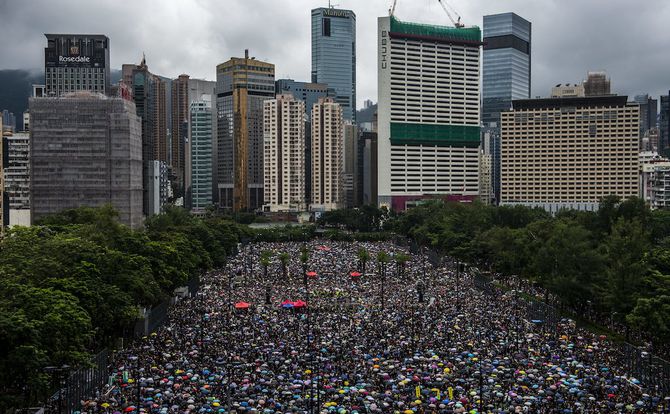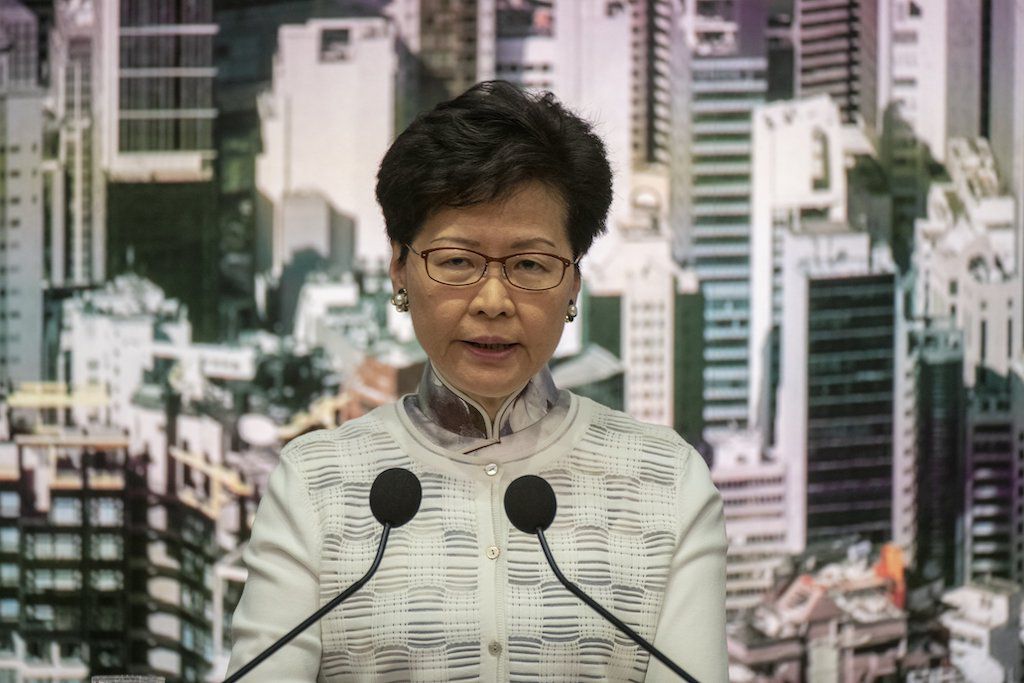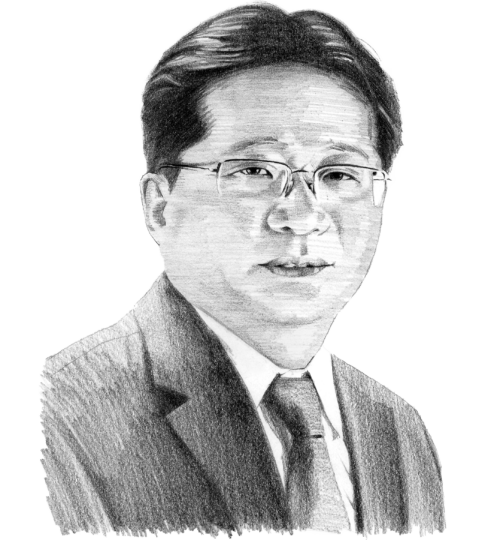A possible scenario for Hong Kong
The protests in Hong Kong do not pose a direct threat to the power of the party-state in China. Beijing must be frustrated by the Hong Kong government’s inability to pacify the protesters and has issued some dire warnings. Using armed police from the mainland, however, to “restore public order” does not appear to be in the cards.

In a nutshell
- The Basic Law of the Special Administrative Region gives China the right to intervene there to restore public order
- Beijing is not eager to step in and Hong Kong residents know that its special status could be in peril if the conflict escalates
- Demonstrations in Hong Kong are likely to become smaller in numbers and largely peaceful
Demonstrations in Hong Kong have continued for some three months now. The street protests started as actions against a draft bill that would make extradition possible between the Hong Kong Special Administrative Region (HKSAR) and other jurisdictions, including the People’s Republic of China. The draft was submitted for approval to the Legislative Council by Hong Kong Chief Executive Carrie Lam. Demonstrators have since increased their demands and are calling for, among other things, universal suffrage to elect Hong Kong officials, full withdrawal of the draft extradition law, the resignation of the chief executive and appointment of a special inquiry commission.
The protests had become increasingly tense and even violent, with one side making complaints of excessive use of force and police brutality, and the other accusing the protesters of violence and cruelty against the police and even bystanders.
Autonomy’s rules
As the situation becomes tenser, speculation is growing as to how Beijing may react to it, especially in light of news reports that Chinese anti-riot troops were gathering in the neighboring mainland city of Shenzhen. Often quoted are the clauses in the Basic Law that, while making the HKSAR government responsible for maintaining public order, also give it the right to ask for the central government’s assistance in enforcing the laws.
China said that deploying its forces to maintain public order could not be ruled out. In reality, however, the legal situation is more nuanced than selected quotes from the Basic Law may suggest.
Since Hong Kong’s transition from British rule to China’s, matters went on mostly undisturbed for almost two decades under the framework of the division of powers along Beijing’s “one country, two systems” policy.
Facts & figures
Hong Kong’s highlights
- 1842: Hong Kong Island becomes a colony of the British Empire at the end of the First Opium War
- 1860: Kowloon Peninsula and Stonecutters Island are added to the colony’s territory following the Second Opium War
- 1898: the colony-establishing process is completed with a 99-year British lease of territories that comprise 86 percent of Hong Kong’s land
- 1941: Japan attacks the colony on the same day it attacks Pearl Harbor and occupies Hong Kong for almost four years; the British resume control in August 1945
- 1950s: Hong Kong becomes the first of the four Asian Tiger economies to industrialize and develops into a major financial center
- 1979: the 25th Governor of Hong Kong, Murray MacLehose, raises the issue of Hong Kong’s future status with Chinese leader Deng Xiaoping
- 1984: the Sino-British Joint Declaration is announced; the United Kingdom agrees to give back the colony to China and Beijing guarantees its capitalist economic setup and political system for 50 years
- 1997: sovereignty over the territory is restored to China; a special Hong Kong administrative region is established
- Today, Hong Kong is ranked among the world’s most competitive and freest economic areas; it scores the highest in Asia on human development indexes and features one of the world’s highest life expectancies
Beijing’s commitment to allow this “local administrative region of the People’s Republic of China” that is located on the eastern side of the Pearl River estuary in southern China and comes “directly under the Central People’s Government”to enjoy “a high degree of autonomy” was enshrined in Hong Kong’s Basic Law. Under it, the HKSAR is “vested with legislative power.” The National People’s Congress in Beijing can only return a piece of Hong Kong’s legislation, not amend it if the congress concludes it does not conform with the Basic Law’s clauses on relations with, and responsibilities of, the central government. The administrative region’s legal environment is different from the mainland’s because the laws enshrined in the Basic Law are “the laws previously in force in Hong Kong,” meaning including those under British rule. Furthermore, Hong Kong is vested with “executive power” and “independent judicial power, including that of final adjudication.” The central government is responsible for foreign affairs and defense of Hong Kong.
Hong Kong’s Umbrella movement (September-December 2014) was the first signal of brewing discontent, especially among the youth. Under the current circumstances of protracted new protests, the clause in the Basic Law that reads, “The Government of the Hong Kong Special Administrative Region shall be responsible for the maintenance of public order in the Region,” is frequently invoked.
China observers believe that Beijing will not accept the demonstrators’ demands.
However, the Basic Law also allows Hong Kong authorities to ask for assistance from the mainland in maintaining public order. Furthermore, Article 18 states that if China’s congress “decides to declare a state of war or, by reason of turmoil within the Hong Kong Special Administrative Region which endangers national unity or security and is beyond the control of the government of the Region, decides that the Region is in a state of emergency,” the central government “may issue an order applying the relevant national laws” in the HKSAR.
The Hong Kong garrison of the Chinese People’s Liberation Army (PLA) may, therefore, be ordered to assist in maintaining public order.
Practical challenge
Most China observers believe that Beijing will not accept the demonstrators’ demands. It seems highly likely that Chief Executive Lam might be relieved of her duties at some point, but China is not going to let it appear to happen under pressure from protesters. The chief executive has already apologized for mishandling the extradition bill. However, her inability to diffuse the situation in the first place and allowing the discontent to grow to the present levels have damned her in the eyes of the central government and the Hong Kong public (despite Beijing’s expressions of full support to the executive).

The extradition bill was declared “dead” by the chief executive and will be formally off the table when the term of the current Legislative Council ends in 2020. A fact-finding study to establish what led to the crisis and make recommendations to the Hong Kong government is already in the works. Also, the Independent Police Complaints Council, appointed by the chief executive, will investigate the events and complaints against the police. A communication platform will be created for dialogue with Hong Kong residents. However, regardless of these steps to address the public’s concerns, practically all observers agree that changes to the Basic Law and other systemic demands will not be accepted by China.
If in response to this, radical elements take over the “leaderless” protest movement, the violence spirals out of control and the red lines established by Beijing are crossed, Hong Kong residents may ultimately forfeit the benefits they have enjoyed. Instead of a high degree of autonomy based on laws that undergird the residents’ current lifestyle and the city’s status as a global business hub, its legal system would become subjected to the mainland laws. Hong Kong residents, always pragmatic and rational, probably understand this very well and would rather avoid any violence that could trigger Beijing’s reaction.
From Beijing’s perspective, it is a practical challenge: How can it overcome this wave of protests with minimum damage to China’s image and maintain the status quo? This is important in light of the 70th anniversary of the People’s Republic of China on October 1, 2019.
It looks likely that after the schools start in September, Hong Kong’s authorities will resort to legal actions. There will be court cases against the most active protesters and most violent offenders, and there will be legal and financial consequences. As students go back to school, many experts predict, they may have less time and inclination to protest.
Scenarios
Judging from Beijing’s current behavior, nothing as drastic as declaring a state of emergency or China’s direct intervention in Hong Kong is in the cards. Hong Kong is not Beijing or a city on the mainland. Demonstrations, if they do not cross China’s red lines, do not threaten the power and survival of the party-state in China. True, Hong Kong is hurting itself as a center of international business, but that does not affect the mainland as much as would have been the case a decade ago. Shanghai is competing for this business role already. Hong Kong is harming itself as the city that is “all about business,” as one observer aptly described it. Its image as an international business hub is the most powerful asset that the city has. Thus, the most likely scenario is that, given the “death” of the extradition bill, the possible departure of Carrie Lam and Beijing’s use of the “potential use of force” card among other actions, these protests are likely to continue in a more peaceful manner.
Hong Kong's Basic Law is to remain unchanged until 2047, according to the Joint Declaration between China and the United Kingdom. This is still almost 30 years away – quite a long stretch of time during which Hong Kong may want to be left alone, as it is. That was its best option for the past 20 years and it remains the least bad of the options available today. Maintaining the status quo does not mean that the demands by a significant portion of Hong Kong residents will disappear. As the 2047 timeline approaches, these will need to be addressed by both sides, patiently and without resorting to force. At present, however, violence on Hong Kong’s streets does not seem to be abating. A tragedy may still be in the making.








